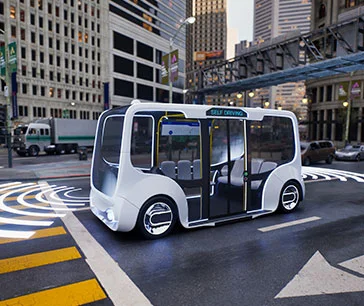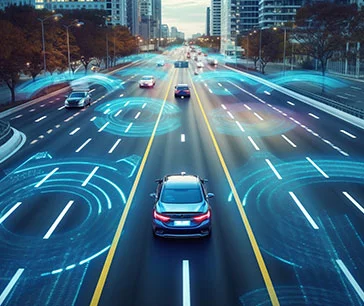Table Of Contents
- Autonomous Vehicles: Paving the Way for Safer and Efficient Transportation
- Electric Vehicle Dominance: Shifting Towards Clean and Sustainable Mobility
- Sustainability and Green Initiatives: Embracing Environmentally Friendly Practices
- Mobility as a Service: Transforming the Way We Commute
- Connectivity and IoT Integration: Creating a Connected Ecosystem for Enhanced Driving Experience
- Shaping the Future of Automotive & Transportation

Lalit Janardhan Katare

Abhay Singh
Automotive & Transportation: A Look at the Top 5 Trends Reshaping the Industry in Q1 2024

The automotive and transportation sector is undergoing rapid transformation driven by innovative trends. Innovation and evolving consumer demands are steering the industry towards a dynamic future. The rise of electric vehicles, advancements in autonomous driving technology, and a growing emphasis on sustainable practices are reshaping the sector. In Q1 2024, several key trends are expected to shape the industry landscape, revolutionizing the way we commute, transport goods, and interact with vehicles. Allied Market Research has identified five significant trends that will have a profound impact on the automotive & transportation sector in the first quarter of 2024.
Autonomous Vehicles: Paving the Way for Safer and Efficient Transportation
In an effort to address pollution and traffic congestion, autonomous transportation systems are gaining traction. Self-driving cars equipped with sensors, LIDAR, and advanced safety features can navigate roads autonomously. The global autonomous vehicle market is expected to garner a revenue of $60.3 billion in 2025. These vehicles use camera technology and AI algorithms to detect and interpret road signs and objects, enhancing road safety. Additionally, the commercialization of delivery drones and driverless trucks will bring greater efficiency to logistics and transportation while addressing driver shortage challenges.

Electric Vehicle Dominance: Shifting Towards Clean and Sustainable Mobility
The global electric vehicle market is projected to reach $823.75 billion by 2030. Electric vehicles (EVs) are no longer a novelty but are rapidly becoming a mainstream choice. With advancements in battery technology, charging infrastructure, and increased environmental awareness, EVs are set to dominate the market in Q1 2024. Major automakers are investing heavily in EV production, offering consumers an enticing combination of clean, sustainable transportation and cutting-edge technology. The transition to EVs contributes to reduced emissions and a greener future.
Sustainability and Green Initiatives: Embracing Environmentally Friendly Practices
Environmental consciousness has become a mandate for the automotive & transportation industry. In Q1 2024, manufacturers are expected to actively reduce their carbon footprints by adopting eco-friendly production processes and materials. Hybrid and electric vehicles play a crucial role in reducing emissions, while the use of recyclable and biodegradable materials in car manufacturing promotes sustainability. Green energy in transport, such as energy-efficient propulsion systems in ships, alternative fuels, and electric trains, further reduces the industry’s environmental impact. The global green logistics market is estimated to grow at a CAGR of 8.3% from 2023 to 2032.

Mobility as a Service: Transforming the Way We Commute
The transportation industry is adopting mobility as a Service (MaaS) to enhance consumer comfort and convenience. The implementation of MaaS ensures the seamless provision of transport services on demand. MaaS integrates various digital channels, allowing users to plan and book multiple modes of transportation through a single platform. It simplifies payments through subscription and pay-as-you-go models. Furthermore, MaaS empowers users to blend public and private transportation, providing flexibility in choosing optimal transport modes. It discourages private vehicle ownership by offering services such as carpooling, on-demand cabs, bookable intercity travel, and more. A reduction in the number of vehicles on the roads leads to lower emissions, decreased pollution, and fewer accidents.
Connectivity and IoT Integration: Creating a Connected Ecosystem for Enhanced Driving Experience
The automotive landscape is evolving into a connected ecosystem, leveraging the power of the Internet of Things (IoT). The global IoT in automotive market was valued at $102.3 billion in 2022 and is projected to reach $760.3 billion by 2032. It is expected that vehicles, infrastructure, and pedestrians will be seamlessly connected, revolutionizing the driving experience. Connected cars offer advanced infotainment systems, real-time traffic updates, and intelligent features, such as driver safety monitoring and fuel-level tracking. IoT-enabled sensors improve traffic flow, reduce congestion, and enhance road safety by redirecting vehicles to faster routes.

Shaping the Future of Automotive & Transportation
As per Allied Market Research, as we enter Q1 2024, the Automotive & Transportation industry is undergoing a remarkable transformation driven by technological advancements and environmental concerns. The top five trends identified by Allied Market Research, including autonomous vehicles, electric vehicle dominance, sustainability initiatives, mobility-as-a-service, and connectivity with IoT integration, are reshaping the industry landscape. These trends promise safer, greener, and more connected transportation solutions, revolutionizing the way we travel and interact with vehicles. The future of mobility is exciting, and these trends herald a new era of transportation innovation and sustainability. To obtain deeper insights, get in touch with our esteemed analysts.

